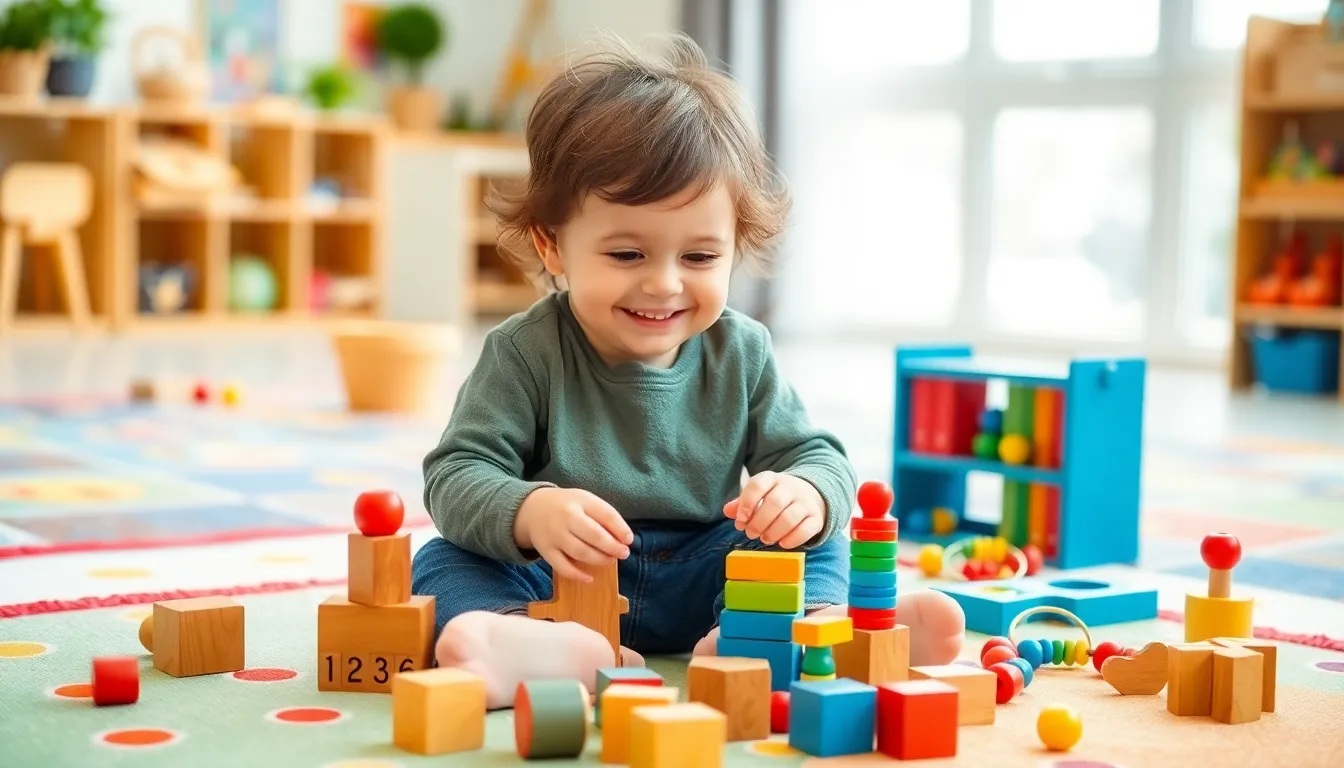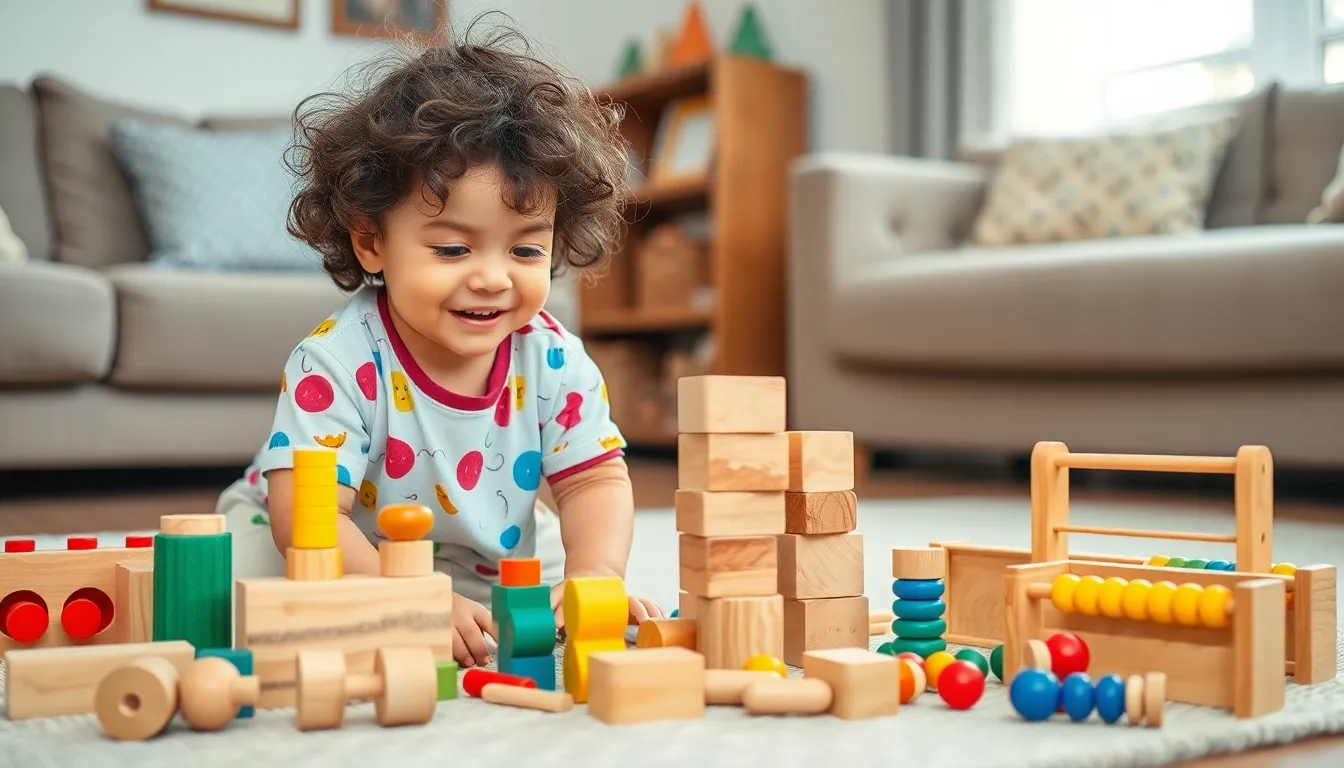In a world where toddlers often prefer their screens over simple toys, Montessori counting toys stand out like a unicorn at a dog park. These delightful tools not only spark joy but also turn learning into a playful adventure. Imagine a toy that helps little ones count while they giggle, explore, and maybe even try to eat a few colorful pieces along the way.
Montessori counting toys encourage hands-on learning and foster a love for numbers that sticks around longer than that mystery goo stuck to the bottom of your shoe. By blending education with play, these toys make counting feel less like a chore and more like a treasure hunt. So, if you want to transform your child’s playtime into a math-filled journey, it’s time to dive into the world of Montessori counting toys. Who knew numbers could be this much fun?
Table of Contents
ToggleOverview of Montessori Counting Toys
Montessori counting toys provide engaging tools designed to enhance mathematical understanding in young children. These toys often feature colorful and tactile elements that capture a child’s attention and motivate active exploration. Countless options exist, from basic wooden blocks to more intricate bead sets, offering various ways for toddlers to engage with numbers.
Children learn best through play, and Montessori counting toys focus on hands-on experiences. Engaging with these toys allows kids to practice counting, sorting, and pattern recognition in a fun environment. By encouraging self-directed learning, these tools help children develop critical thinking and problem-solving skills.
Additionally, Montessori counting toys promote fine motor skill development. Using their hands to manipulate pieces strengthens hand-eye coordination and dexterity. Moreover, the sensory aspects of these toys, such as textures and colors, provide an enriched learning experience that stimulates both cognitive and physical growth.
Parents appreciate these toys because they support early math skills without overwhelming children. They often feature age-appropriate designs making them suitable for various developmental stages. Since many Montessori counting toys are made from natural materials, they offer a safe and eco-friendly option.
Incorporating these educational toys into playtime nurtures a child’s natural curiosity and love for learning. Children exposed to Montessori principles tend to show improved retention of mathematical concepts, setting a strong foundation for future academic success. Thus, Montessori counting toys effectively transform learning into an enjoyable adventure that cultivates a lifelong interest in numbers.
Benefits of Montessori Counting Toys

Montessori counting toys offer several advantages that support early childhood development. These engaging tools provide a basis for mathematical learning while promoting active exploration.
Enhancing Mathematical Skills
Montessori counting toys foster a child’s understanding of mathematics through hands-on experiences. Children engage with colorful objects to practice counting, sorting, and pattern recognition. Exploring various shapes and sizes enhances their ability to grasp complex concepts. Through playful interaction, children develop logic and critical thinking skills that benefit future academic pursuits. Additionally, these toys build a solid foundation for number recognition, which is crucial as they progress in their education. Parents appreciate how these toys make learning enjoyable, as children often show increased enthusiasm when interacting with them. Statistics suggest that children exposed to these methods excel in math-related tasks due to early exposure and practice.
Promoting Fine Motor Skills
Montessori counting toys significantly contribute to fine motor development in young children. Manipulating beads, blocks, and other elements encourages the use of small hand muscles. Grasping, stacking, and sorting these items enhance dexterity and hand-eye coordination. As kids engage with these activities, they also improve their concentration and focus. Parents notice that hands-on experiences lead to more confident and capable children. Respecting developmental stages, these toys cater to various skill levels, allowing for gradual progression. Activities involving Montessori toys often translate to improved writing skills and other tasks requiring precision. Using natural materials further promotes sensory development, creating a comprehensive learning experience.
Types of Montessori Counting Toys
Montessori counting toys come in various forms, each designed to promote mathematical understanding in young children. Engaging with these toys helps children develop essential counting skills while enjoying themselves.
Wooden Counting Blocks
Wooden counting blocks provide a tactile experience for young learners. These blocks often feature numbers, colors, and patterns, allowing for counting, sorting, and stacking. Children can explore pre-math skills as they manipulate these durable, eco-friendly materials. Often, sets include different shapes and sizes to enhance creativity and problem-solving abilities. By incorporating colors and varied dimensions, wooden counting blocks captivate children’s attention while fostering fine motor development.
Counting Beads and Strings
Counting beads and strings create a hands-on learning opportunity. Typically, these toys consist of vibrant beads that children can thread onto strings. This activity improves dexterity and coordination as children practice counting each bead. Many sets include different colors and sizes, encouraging pattern recognition along the way. Engaging with counting beads fosters a sense of accomplishment as children complete various projects, reinforcing their understanding of numbers through play.
Number Cards and Puzzles
Number cards and puzzles offer an interactive approach to learning numerical concepts. These educational tools come in various designs, often featuring vibrant illustrations that appeal to children. Children recognize numbers while matching them with corresponding images or completing puzzles. This visual connection supports memory retention and aids in understanding basic math concepts. Parents find that incorporating these activities into playtime sparks curiosity, making the learning experience enjoyable and effective.
Choosing the Right Montessori Counting Toys
Selecting appropriate Montessori counting toys enhances early math learning and aligns with children’s developmental stages. Parents should consider various factors to ensure the right fit for their child’s needs.
Age Appropriateness
Age-appropriate toys cater to specific developmental milestones. Infants benefit from larger, soft counting toys that encourage grasping and exploration. Toddlers enjoy colorful blocks and beads that promote counting and sorting. Preschoolers thrive with puzzles and interactive materials that challenge their growing skills. Understanding developmental stages allows parents to choose toys that encourage engagement and learning. Toys designed for emerging skills support foundational mathematical concepts effectively.
Material Quality
Material quality influences toy longevity and safety. Many Montessori counting toys are crafted from natural, non-toxic materials like wood. High-quality materials not only endure wear and tear but also ensure a safe play environment. Wooden toys often feature vibrant finishes that are colorful yet safe for children. Eco-friendly options appeal to environmentally conscious parents seeking sustainable education tools. Choosing durable materials enhances the play experience while promoting responsible consumer choices.
Montessori counting toys stand out as a valuable resource for fostering early mathematical skills in children. Their engaging designs not only captivate young minds but also promote essential cognitive and physical development. By transforming counting into a fun and interactive experience, these toys nurture a child’s natural curiosity and love for learning.
Parents can feel confident in choosing Montessori counting toys, knowing they support age-appropriate learning while ensuring safety and durability. With a variety of options available, from wooden blocks to counting beads, there’s something for every child’s developmental stage. Incorporating these toys into playtime can lead to a lasting impact on a child’s educational journey, laying the groundwork for future success in mathematics and beyond.



